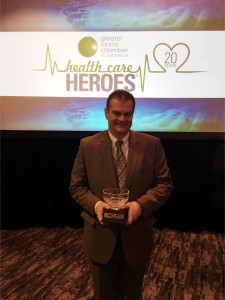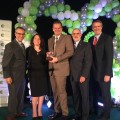NSU Newsroom
SharkBytes
Horizons
This version of NSU News has been archived as of February 28, 2019. To search through archived articles, visit nova.edu/search. To access the new version of NSU News, visit news.nova.edu.
This version of SharkBytes has been archived as of February 28, 2019. To search through archived articles, visit nova.edu/search. To access the new version of SharkBytes, visit sharkbytes.nova.edu.
NSU’s Dr. H. Thomas Temple Named a Health Care Hero
The Greater Miami Chamber of Commerce honored H. Thomas Temple, M.D., as a “Health Care Hero” at its 20th annual Health Care Heroes® Award ceremony, which was held May 9, 2017 at Jungle Island in Miami. Dr. Temple, who is senior vice president of translational research and economic development for Nova Southeastern University (NSU), was the recipient of the Bio-Medical Award for his lifetime of work in this field.
“Dr. Temple is multidimensional—an inventor, a surgeon, a university administrator and a family man,” said NSU President Dr. George Hanbury, who nominated Dr. Temple for the award. “Through all of these roles, his goal is simple—to make a lasting impact on humanity.”
According to the Chamber, the Health Care Heroes® Awards program recognizes individuals, institutions, professionals, students, volunteers and programs, who through their individual or collective actions have made an extraordinary impact in the South Florida health care community.
Health Care Heroes’ acts of heroism represent a display of dedication to excellence in their area of expertise beyond the scope of their jobs. Through their commitment to their profession and community, they serve as an inspiration to others in an effort to improve the quality of health care and discover new ways to assist those in need.
A world-class orthopedic surgeon whose career spans three decades, Dr. Temple specializes in treating both children and adults with bone and soft tissue cancers. His work in orthopedic oncology has focused on sparing limbs for patients with bone tumors and finding alternative ways to treat them without using toxic chemotherapy.
He has played a key role in multiple biomedical inventions that have made a difference in the lives of people throughout the world, helping them regain the use of their limbs and joints. His key products include the MIAMI (marrow-isolated adult multi-lineage inducible) cell, a type of stem cell derived from adult bone marrow; ViaGraft, used to regenerate bone; BioCartilage, marketed internationally for cartilage repair; ViaDisc, an intervertebral disc cell matrix that restores diseased discs, and a host of other regenerative orthopaedic products. He currently holds 12 patents, all of which have been developed into commercial products to treat patients.
As NSU’s senior vice president of translational research and economic development, he is responsible for building the connections, resources and entrepreneurial energy for the commercialization of the university’s research activities to foster research that makes a direct impact on people and the environment. He also serves as executive associate dean for research for NSU’s College of Allopathic Medicine (M.D. College). He has already achieved much success, most notably through the creation of the NSU Cell Therapy Institute, an international collaboration with prominent medical research scientists from NSU’s M.D. College and Sweden’s world-renowned Karolinska Institutet (KI), which is focused on conducting pioneering cell-based biomedical research.
His current research efforts are centered around creating and expanding tissue and cell libraries that can be used to develop targeted strategies to treat patients with malignant tumors of the skeletal system.


